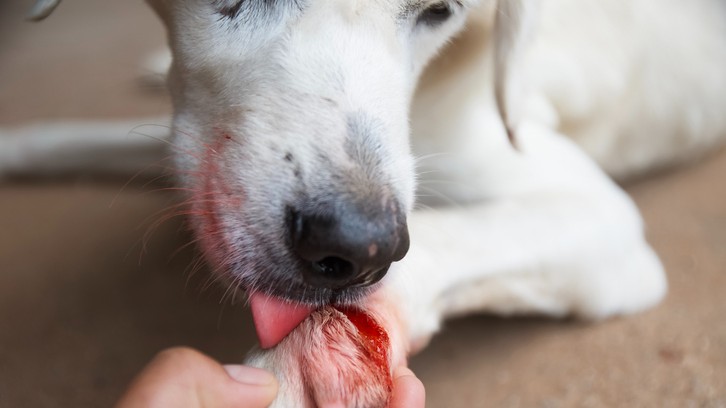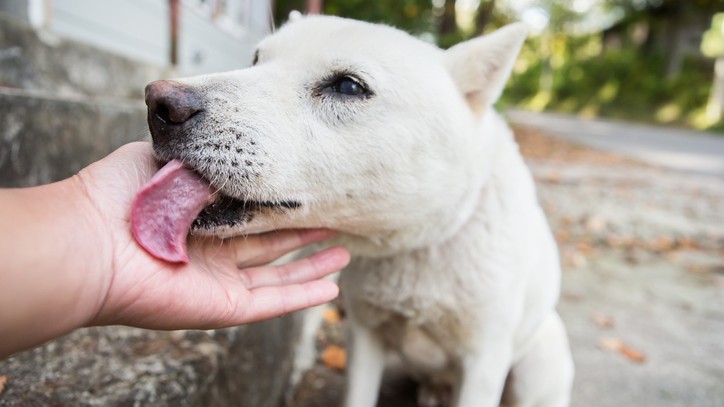Does dog saliva heal wounds?
Does dog saliva heal wounds, or can it do more harm than good? We find out

Does dog saliva heal wounds? Some believe so, but generally you’ll want to keep your dog away from any wounds that they have. If they’re not fond of the “cone of shame”, make sure to check out these six head cone alternatives for something that they might tolerate a little more.
While it may be somewhat true that there are some slight antimicrobial properties to dog saliva, generally speaking licking wounds is a bad idea and can cause more harm than the good that it might do.
In the wild, dogs will have licked their wounds in a bid to keep them as clean as possible, but the pampered modern pooch, with little else to do but lick, lick, lick can soon come a cropper if you don’t discourage the behavior as soon as you can.
Why do dogs lick their wounds?
It’s a perfectly natural behavior for your dog to lick their wounds, whether it’s a relatively minor injury or something a bit more drastic. One of the main reasons that dogs lick their wounds is to soothe pain – a bit like if you were to rub your arm if you were to bang it – the distraction can block out the pain. Dogs use their tongues in a similar way to how humans use their hands, after all.
They might also be doing it in order to clean out any debris or dirt that has got lodged in the wound. While there are some slight antimicrobial properties to dog saliva, it’s important to note that it’s only certain bacteria which are killed by dog saliva, while others actually thrive in it – so overall it’s a better idea to clean the wound yourself if you can.
Minor cuts and scratches can quickly develop into something more problematic if you allow your dog to keep licking it. Do your best to prevent the behavior, or distract them. More serious problems, such as wounds with stitches, need particular attention.
You might also find that your dog licks wounds in certain places more than in others, especially areas which are particularly easy to reach. It’s important to think about why do dogs lick their paws, as this can be a particularly problematic area with some hounds.
If your dog is excessively licking other areas on their body and you can’t see any obvious wounds, then it’s important to consider skin allergies in dogs, which can also cause the behavior.

Why do dogs lick human wounds?
It’s not just their own wounds that a dog might try to “heal” with its saliva – if you’ve ever cut yourself, you might find that your furry friend tries to help in the only way they know how. It’s also somewhat reasonable to assume that they might also like the taste of an open wound.
Essentially, you and your dog are part of the same pack. As such, the natural instinct is to protect and help other members of the pack. While it was long-ago thought that dog saliva could help heal wounds, it should go without saying that modern medicine is of course preferable in every situation.
It doesn’t take much imagination to think about what your dog likes to spend their time licking and eating that could be transferred to an open wound – so you shouldn’t let it happen if you can help it at all.
There could be other reasons for your dog showing you a lot of interest – find out why is my dog licking me in our guide.
Is dog saliva good for wounds?
The short answer here is no, not really. While there are some antibacterial properties in dog saliva, this is usually outweighed by the problems that excessive licking can do, and other bacteria that can be introduced.
Licking can lead to infections which make the wound worse, and will need further treatment, so it’s important to stop or discourage your dog from licking their wounds as best you can.
As your dog’s tongue is quite rough, excessive licking can also damage or cause irritation to the wound and the skin around it, which can also cause issues.
If you notice a wound on your dog’s skin, the best thing you can do is clean it gently. Most of the time, warm, clean water will do the job perfectly well, but you can also use specially formulated antiseptic spray or powder for pets if the wound is particularly deep or you just want to be sure. Once the wound is clean, you may find that the dog is less inclined to want to clean it themselves too.
It’s important to look out for problems with wounds which can be caused by licking – you might even find yourself asking is my dog sick. If you notice anything such as redness, inflammation, pus or discharge, the wound reopening (particularly if it’s one with stitches) or the wound taking a very long time to heal, it’s important to speak to a veterinarian for advice.
How to stop a dog licking a wound
There are a few key ways to stop your dog from licking a wound, often depending on how severe it is.
Of course, we’ve already mentioned the “cone of shame”, but alternatives which do pretty much the same job are available in abundance too.
You might also want to look out for specialized clothing which will cover the wound, but still provide plenty of ventilation to it – female dogs will often wear a “babygro” type top after recovering from neutering surgery for example. For paw injuries, which are very common, socks or booties can be a good way to keep your furry friend’s tongue away from the affected area. Specific wound dressings, usually administered by your vet, can also come in handy too.
Distracting your dog is also a fantastic idea, since it will take their mind off the task at hand. There are plenty of ways you could do that – ranging from playing with them (depending on how severe/the location of the wound) to giving them a great brain game for dogs which you could slowly feed them from.
PetsRadar Newsletter
Get the best advice, tips and top tech for your beloved Pets
Amy Davies is a freelance writer and photographer with over 15 years experience. She has a degree in journalism from Cardiff University and has written about a huge variety of topics over the years. These days she mostly specialises in technology and pets, writing across a number of different titles including TechRadar, Stuff, Expert Reviews, T3, Digital Camera World, and of course PetsRadar. She lives in Cardiff with her dog, Lola, a rescue miniature dachshund.
